Creating a Supplement Stack for Emotional Independence and Balance
Introduction
Emotional independence is the ability to feel deeply, think clearly, and stay balanced—no matter what’s happening around you. It’s not about detachment or self-isolation. Instead, it’s about learning to regulate your own emotions without depending on others for validation, reassurance, or peace.
For many people healing from co-dependency, trauma, or emotional burnout, the journey toward independence can feel both empowering and exhausting. The nervous system, after years of running on adrenaline and hypervigilance, may feel raw, overactive, or depleted. That’s where targeted nutritional support can make a profound difference.
This isn’t about numbing your emotions—it’s about nourishing your biology so that emotional stability becomes your natural baseline. The right supplement stack can strengthen the chemical and hormonal systems that regulate mood, energy, focus, and calm—helping you create a steady inner world even when external situations shift.
In this guide, we’ll explore how to build a personalized supplement stack for emotional independence—covering nutrients, adaptogens, amino acids, and herbs that work together to regulate stress, promote confidence, and enhance balance. 🌸
Looking for supplements for This? Click here.
Why Emotional Independence Is Biochemical 💭

Emotional dependence is not just a psychological pattern—it’s also a physiological one. When you rely on others to calm you, your body is outsourcing its nervous system regulation. Over time, your brain chemistry becomes conditioned to external reassurance.
Under chronic stress or emotional instability, the body’s systems can become imbalanced:
✨ Cortisol (the stress hormone) stays high.
✨ Serotonin and GABA (the calm neurotransmitters) drop.
✨ Dopamine (the motivation molecule) fluctuates wildly.
✨ Adrenal fatigue sets in, leaving you tired but wired.
This is why healing from co-dependency or emotional exhaustion often feels so hard—you’re not just changing habits; you’re rewiring your nervous system.
By giving your brain and body the nutrients they need to regulate naturally, you build a biochemical foundation for true independence. 🌿
The Foundation: Nervous System Support 🌙
Before adding complex stacks, it’s essential to strengthen your nervous system. Think of this as rebuilding your internal “safety net”—so you can process emotions without overwhelm.
Here’s where to start:
Magnesium: The Calming Mineral 🌸
Magnesium is essential for over 300 biochemical reactions in the body, many related to stress regulation and muscle relaxation. It supports GABA production, balances cortisol, and soothes nervous tension.
Without enough magnesium, your body remains in fight-or-flight mode. You may notice racing thoughts, insomnia, or heightened reactivity.
Best forms:
Magnesium glycinate: Calming and gentle for sleep.
Magnesium threonate: Supports cognitive and emotional clarity.
Suggested dose: 200–400 mg daily, ideally at night.
L-Theanine: Calm Focus Without Sedation 🍵
Found in green tea, L-Theanine increases alpha brain waves—the same ones associated with meditation and creative flow. It enhances focus while reducing anxiety.
L-Theanine helps you pause before reacting, making it ideal for those working on boundaries or emotional self-regulation.
Suggested dose: 100–200 mg daily, or as needed for calm focus.
Pairs well with: Magnesium and GABA for a soothing effect.
GABA: Restoring Emotional Safety 🕊️
Gamma-Aminobutyric Acid (GABA) is your brain’s main inhibitory neurotransmitter. It helps you feel relaxed and grounded. Many people healing from trauma or co-dependency have low GABA levels due to prolonged cortisol exposure.
Supplementing with GABA can help you:
💭 quiet mental chatter
💤 sleep deeper
💗 feel more secure in your body
Suggested dose: 250–500 mg daily, best taken at night.
The Energy Layer: Motivation and Emotional Drive ⚡
Once your body feels safe, it’s time to rekindle emotional energy—the spark that drives purpose and self-direction.
L-Tyrosine: The Dopamine Builder 💪
L-Tyrosine is a precursor to dopamine and norepinephrine—the neurotransmitters responsible for motivation, confidence, and mental clarity. When you’ve spent years people-pleasing or overextending, your dopamine stores can become depleted.
Restoring dopamine helps you act from internal drive rather than external validation.
Suggested dose: 500–1,000 mg in the morning on an empty stomach.
Pairs well with: B vitamins and Rhodiola Rosea.
B Vitamins: Energy and Resilience 🌞
B vitamins—especially B6, B9 (folate), and B12—are essential for neurotransmitter production and adrenal health. They help you manage stress while supporting energy metabolism.
Emotional recovery often requires extra B-vitamin support to rebuild depleted reserves.
Suggested dose:
A high-quality B-complex with active forms (methylcobalamin, methylfolate, P-5-P) once daily.
Benefit: More energy, improved focus, and fewer emotional crashes.
Looking for supplements for This? Click here.
Rhodiola Rosea: The Emotional Stabilizer 🌺
Rhodiola is a remarkable adaptogen that enhances mental stamina, stabilizes cortisol, and promotes balanced energy.
Unlike stimulants, it doesn’t push your system—it teaches it balance. You’ll feel energized but calm, alert yet grounded.
Perfect for those rebuilding independence after emotional burnout.
Suggested dose: 200–400 mg daily, early in the day.
Pairs well with: L-Tyrosine and B vitamins for resilience.
The Inner Peace Stack: Emotional Regulation 🌿
Healing emotional reactivity is about restoring neurochemical harmony—balancing serotonin, GABA, and cortisol. This allows you to feel deeply without drowning in it.
Ashwagandha: Calming the Stress Response 🌙
Ashwagandha, one of the most studied adaptogens, reduces cortisol and supports thyroid function. It’s a tonic for both mind and body, enhancing resilience and emotional stability.
It helps you feel calm, not detached—perfect for people learning to stay grounded under emotional pressure.
Suggested dose: 300–600 mg daily, ideally in the evening.
Omega-3 Fatty Acids: Brain Nourishment and Mood 🌊
Omega-3s (EPA/DHA) are critical for emotional regulation and brain plasticity. They support serotonin signaling and protect neurons from inflammation caused by chronic stress.
Low omega-3 intake is associated with anxiety, depression, and mood swings.
Suggested dose: 1,000–2,000 mg combined EPA/DHA daily.
Pairs well with: Vitamin D and curcumin for brain health.
Vitamin D: The Mood Hormone ☀️
Vitamin D is essential for serotonin synthesis and emotional balance. Many people with anxiety or depression are deficient, especially those who spend little time outdoors.
By restoring vitamin D levels, you strengthen both mood and self-trust.
Suggested dose: 2,000–5,000 IU daily with fat-containing meals.
5-HTP: Serotonin Support for Inner Calm 🌸
5-Hydroxytryptophan (5-HTP) is a natural precursor to serotonin—the neurotransmitter of contentment and connection. It helps improve mood, reduce anxiety, and calm emotional turbulence.
Caution: Don’t combine 5-HTP with antidepressants (SSRIs or MAOIs) without medical guidance.
Suggested dose: 50–100 mg in the evening.
Pairs well with: Vitamin B6 and magnesium for optimal conversion.
The Grounding Layer: Adrenal and Gut Health 🌾
Emotional independence also depends on physical resilience. The gut-brain axis and adrenal system play major roles in emotional balance. If either is depleted, your mood and energy will fluctuate.
Probiotics: Emotional Stability Starts in the Gut 🌱
Over 90% of serotonin is produced in the gut, and stress can disrupt this balance. Probiotics restore healthy gut flora, which reduces inflammation and anxiety.
Certain strains like Lactobacillus rhamnosus and Bifidobacterium longum have been shown to reduce cortisol and improve emotional resilience.
Suggested dose: One high-quality multi-strain probiotic daily.
Pairs well with: Prebiotic fiber (like inulin or resistant starch).
Vitamin C: The Adrenal Repair Nutrient 🍊
The adrenal glands contain one of the highest concentrations of vitamin C in the body. Chronic stress depletes it quickly.
Vitamin C helps rebuild adrenal strength, stabilize cortisol, and improve overall vitality.
Suggested dose: 500–1,000 mg twice daily.
Pairs well with: B vitamins and magnesium for stress recovery.
Adaptogenic Blends: Long-Term Balance 🌸
Combining adaptogens creates a synergistic effect for emotional balance. Look for blends that include:
🌿 Ashwagandha – Calming, cortisol-lowering.
🌺 Rhodiola Rosea – Energizing, focus-enhancing.
🍄 Reishi Mushroom – Immune-boosting, grounding.
🌱 Holy Basil (Tulsi) – Restores serenity and optimism.
These blends are ideal for people transitioning from emotional reactivity to consistent independence.
Looking for supplements for This? Click here.
Building Your Personalized Stack 🌞
Here’s how you can create a balanced daily stack based on your emotional needs:
🌿 Morning Stack (Clarity & Confidence)
L-Tyrosine – 500 mg
B-Complex – 1 capsule
Rhodiola Rosea – 200 mg
Vitamin D3 – 2,000 IU
Omega-3 – 1,000 mg
💫 Purpose: Boost dopamine, focus, and motivation for self-directed action.
🌸 Afternoon Stack (Energy & Stability)
Magnesium glycinate – 200 mg
Vitamin C – 500 mg
Probiotic – 1 capsule
CoQ10 – 100 mg
💫 Purpose: Maintain balanced energy and support adrenal recovery.
🌙 Evening Stack (Calm & Restoration)
Ashwagandha – 500 mg
L-Theanine – 200 mg
GABA – 300 mg
5-HTP – 50 mg (optional)
Omega-3 – 1,000 mg
💫 Purpose: Promote calm, better sleep, and emotional integration.
The Role of Self-Awareness in Supplementation 🧘
No supplement can replace self-awareness—but it can support it. As you nourish your body, take time to observe how each nutrient affects your mood, energy, and sense of stability.
Notice shifts like:
💭 feeling calmer during conflict
💗 waking up more refreshed
⚡ regaining motivation without burnout
🌿 thinking clearly before reacting
These are signs that your nervous system is recalibrating—and that emotional independence is taking root not just in your mind, but in your biology.
Integrating Emotional Practices 🌸
For maximum benefit, pair your supplement stack with lifestyle and emotional practices that reinforce inner balance:
🧘 Breathwork: Calms the vagus nerve and enhances GABA activity.
Want to try Breathwork? Click Here.
🌳 Nature walks: Lower cortisol and promote emotional grounding.
📖 Journaling: Clarifies identity and emotional boundaries.
💬 Therapy or coaching: Provides guidance for self-reconnection.
Looking for online therapy ? Click Here.
🕯️ Mindful rituals: Herbal tea, slow mornings, or gratitude practice deepen your connection with self.
Together, these create a holistic environment where your supplements can truly work—nourishing not just your chemistry, but your soul. 🌿
What Emotional Balance Feels Like 💛
As your stack starts to take effect, you may notice profound but gentle shifts:
🌿 You pause before reacting.
🌙 You sleep deeply and wake peacefully.
💫 You stop seeking constant reassurance.
💗 You feel whole, centered, and self-aware.
This is the essence of emotional independence: biological harmony that supports psychological freedom.
A Note on Consistency 🌿
Supplements for emotional balance are not quick fixes. It takes time for neurotransmitter pathways, hormonal rhythms, and gut bacteria to rebalance. Expect gradual improvement over 4–8 weeks.
Keep a simple journal to track progress. Write down your mood, energy, and stress resilience. Over time, you’ll see a pattern of restoration—a calm strength emerging from within.
Final Thoughts 🌸
Emotional independence isn’t about isolation—it’s about inner security. It’s about knowing that no matter who comes or goes, your sense of self remains intact.
Creating a supplement stack is one way to honor that journey. Each nutrient, herb, and adaptogen becomes a quiet ally—helping you stabilize, re-energize, and return home to yourself.
Healing isn’t just emotional—it’s biochemical, cellular, and spiritual. And when your body and mind align, independence stops being a struggle. It becomes your natural state. 🌿💛
References 📚
Panossian, A., & Wikman, G. (2010). Effects of adaptogens on the central nervous system and molecular mechanisms associated with stress-protective activity. Pharmaceuticals.
Kennedy, D. O. (2016). B vitamins and the brain: Mechanisms, dose and efficacy. Nutrients.
Benton, D. (2010). The influence of nutrient status on mood and cognitive performance. British Journal of Nutrition.
Mischoulon, D., & Freeman, M. P. (2013). Omega-3 fatty acids in psychiatry. Harvard Review of Psychiatry.
Chandrasekhar, K. et al. (2012). A prospective, randomized study of Ashwagandha root extract in reducing stress and anxiety. Indian Journal of Psychological Medicine.
Related Posts
-
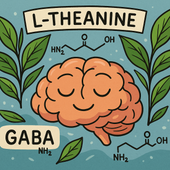
L-Theanine and GABA: Natural Calm for Parkinson’s-Related Anxiety
Anxiety in Parkinson’s often feels overwhelming — a constant inner tension that affects both body and mind. 🌿 This article explores how L-theanine and GABA, two natural compounds that promote relaxation without sedation, can help restore balance, ease restlessness, and calm the nervous system for a more peaceful state of mind. 🌙
-
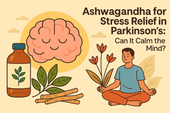
Ashwagandha for Stress Relief in Parkinson’s: Can It Calm the Mind?
Ashwagandha, the ancient Ayurvedic adaptogen, may offer powerful stress relief for people with Parkinson’s. 🌿 By regulating cortisol, calming the nervous system, and supporting dopamine balance, this natural herb helps ease anxiety, improve sleep, and promote emotional stability — restoring calm from the inside out. 🌙
-
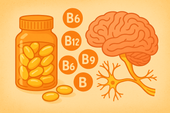
B Vitamins for Mood and Nerve Health in Parkinson’s Patients
B vitamins play a vital role in protecting the brain and nervous system in Parkinson’s. 🌿 From supporting dopamine production to reducing homocysteine and improving mood, these essential nutrients — especially B6, B9, and B12 — help stabilize emotions, boost energy, and preserve nerve integrity for better daily function and mental clarity. 💫
-
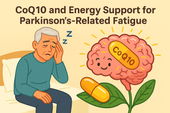
CoQ10 and Energy Support for Parkinson’s-Related Fatigue
Fatigue in Parkinson’s goes far beyond tiredness — it’s a deep cellular exhaustion. ⚡ CoQ10, a natural compound essential for energy production, may help restore vitality by supporting mitochondrial function and protecting brain cells from oxidative stress. Discover how CoQ10 can enhance energy, reduce fatigue, and improve overall resilience in Parkinson’s. 🌿
-
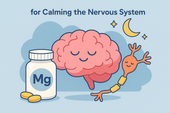
Magnesium for Calming the Nervous System in Parkinson’s
Magnesium is one of the most underrated allies for people with Parkinson’s. 🌿 This calming mineral supports the brain, relaxes tense muscles, and stabilizes the nervous system, helping reduce anxiety, restlessness, and sleep problems. Discover how magnesium nourishes dopamine pathways, protects neurons, and restores a sense of inner peace from within. 💫
-
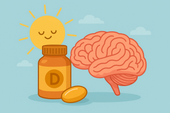
Vitamin D and Mental Health in Parkinson’s: Why Deficiency Matters
Vitamin D is more than a sunshine nutrient — it’s a key player in brain health and emotional balance for people with Parkinson’s. 🌞 This article explores how vitamin D influences dopamine, serotonin, and inflammation, and why deficiency can worsen depression, anxiety, and cognitive decline. Discover how restoring healthy levels can bring clarity, calm, and resilience back to daily life. 🌿
-

Omega-3s and Parkinson’s: Supporting Mood and Cognitive Clarity
Omega-3 fatty acids are among the most powerful nutrients for supporting brain health and emotional well-being in people with Parkinson’s. 🧠 This article explores how omega-3s strengthen neuronal membranes, improve dopamine and serotonin signaling, reduce inflammation, and promote cognitive clarity. Learn how these essential fats can help ease anxiety, lift mood, and protect your mind from oxidative stress naturally. 🌿
-
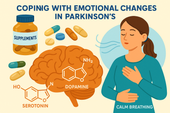
Coping with Emotional Changes in Parkinson’s: Supplements That Support Balance
Emotional changes like anxiety, depression, and irritability are common yet often overlooked symptoms of Parkinson’s disease. This article explores how supplements such as omega-3s, magnesium, and vitamin D can support mood regulation, while therapy and breathwork techniques help restore calm and emotional balance naturally. 🌿
-
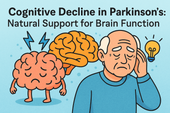
Cognitive Decline in Parkinson’s: Natural Support for Brain Function
Cognitive decline in Parkinson’s can affect memory, focus, and daily independence—but there’s hope. Understanding how the disease impacts brain chemistry opens the door to natural ways of support. From omega-3s and CoQ10 to mindfulness and exercise, you can nourish your brain, boost clarity, and slow decline through holistic care. 🌿🧠
-
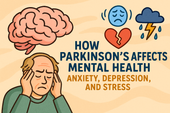
How Parkinson’s Affects Mental Health: Anxiety, Depression, and Stress
Dopamine is the brain’s spark of motivation—the chemical that fuels focus, pleasure, and drive. When dopamine levels are balanced, you feel inspired and alive; when they’re low, everything feels like an uphill climb. Understanding how dopamine works can help you support mental clarity, resilience, and emotional balance naturally. ⚡🧠
-
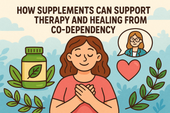
How Supplements Can Support Therapy and Healing from Co-Dependency
Biology is the science of life—an exploration of how cells, systems, and molecules create the foundation for every thought, emotion, and heartbeat. From the way our DNA shapes us to how hormones and neurons communicate, biology reveals the deep interconnectedness between mind and body. Understanding it helps us appreciate the delicate balance that keeps us alive, aware, and evolving. 🌿🧬
-
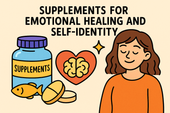
Supplements for Supporting Emotional Healing and Self-Identity
Biology is the bridge between mind and body—the science that explains how cells, hormones, and systems communicate to sustain life. It reveals how emotional states influence physical health, and how nourishment, rest, and movement keep us in balance. Understanding biology helps us reconnect with our natural intelligence and live in harmony with ourselves and the world. 🌿🔬
-
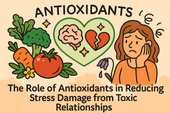
The Role of Antioxidants in Reducing Stress Damage from Toxic Relationships
Biology is the study of life in motion—the intricate dance between cells, systems, and the natural world. From DNA replication to neurotransmitter flow, every process in the human body reflects the intelligence of life adapting and evolving. Understanding this harmony helps us appreciate how nutrition, stress, and environment shape our health and emotional balance. 🌿🔬
-
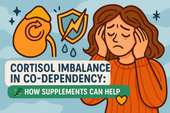
Cortisol Imbalance in Co-Dependency: How Supplements Can Help
Cortisol is the body’s main stress hormone—essential for energy and focus, yet harmful when chronically elevated. When life feels like constant pressure, cortisol imbalance can trigger fatigue, anxiety, and mood swings. Learning how to restore balance through rest, nutrition, and the right supplements can help you rebuild calm, clarity, and resilience from the inside out. 🌿💫
-
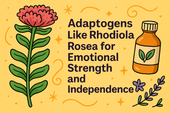
Adaptogens Like Rhodiola Rosea for Emotional Strength and Independence
Adaptogens are nature’s stress-balancing herbs—plants like Rhodiola, Ashwagandha, and Holy Basil that help your body adapt to emotional and physical pressure. They don’t numb or overstimulate; they teach your system how to find calm and stability again. By restoring balance to your hormones, energy, and mood, adaptogens nurture emotional resilience and grounded strength. 🌿✨
-
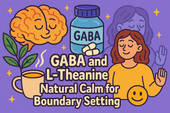
GABA and L-Theanine: Natural Calm for Boundary Setting
Anxiety can feel like a storm inside your mind—constant tension, overthinking, and the inability to relax even when you’re safe. But beneath the chaos, your body is simply trying to protect you. Learning to calm anxiety starts with understanding how your brain and nervous system respond to stress—and how to gently guide them back to peace. 🌿💫
-
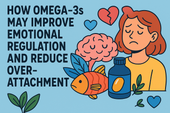
How Omega-3s May Improve Emotional Regulation and Reduce Over-Attachment
Inflammation isn’t just about sore joints or fatigue—it’s also a hidden driver of mood swings, anxiety, and emotional burnout. When chronic stress or poor diet keep the body inflamed, the brain’s chemistry changes, making calm harder to access. Learning how to reduce inflammation through nutrition, rest, and mindful living helps restore balance from the inside out. 🌿💫
-
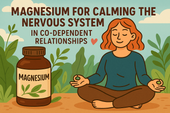
Magnesium for Calming the Nervous System in Co-Dependent Relationships
The nervous system is the body’s communication network, linking your mind and organs through a delicate web of electrical signals. It controls everything from emotional responses to muscle movement—and when it’s overwhelmed by chronic stress or anxiety, balance is lost. Learning how to calm and nourish your nervous system through nutrition, mindfulness, and rest can restore peace and emotional stability. 🌿💫
-
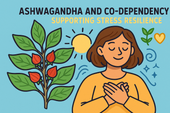
Ashwagandha and Co-Dependency: Supporting Stress Resilience
Stress is more than a feeling—it’s a full-body signal that your system is overwhelmed. When the mind races and the body tenses, your hormones, breathing, and focus all shift into survival mode. Chronic stress doesn’t just affect emotions—it reshapes your nervous system, drains your energy, and clouds your clarity. Learning to understand and manage stress gently is the first step toward peace, balance, and true recovery. 🌿💫
-

Why Co-Dependency Feels Draining: Adrenal Fatigue and Supplements That Help
The adrenal glands are small but powerful organs that sit above your kidneys, acting as your body’s built-in stress managers. They produce hormones like cortisol and adrenaline that help regulate energy, mood, and resilience. When they’re overworked from chronic stress or emotional exhaustion, fatigue and imbalance follow. Supporting adrenal health naturally can help restore calm, energy, and hormonal balance. 🌿⚡
-

The Link Between Anxiety, Co-Dependency, and Natural Support
Anxiety feels like living in constant alert mode—your heart races, your thoughts loop, and your body can’t find peace. It’s the nervous system’s way of preparing for danger, even when none exists. Understanding what’s happening in your mind and body is the first step toward calming the storm and restoring balance. 🌿💫
-

Supplements That Support Dopamine and Serotonin in Co-Dependent Patterns
Serotonin is the neurotransmitter of calm, confidence, and contentment. When it’s balanced, you feel peaceful and emotionally grounded. When it’s low, anxiety, mood swings, and emotional dependence take over. By understanding serotonin’s role in emotional health—and how to support it naturally—you can rebuild inner stability, improve relationships, and cultivate lasting happiness from within. 🌞💫
-

How Emotional Exhaustion in Codependency Impacts the Nervous System
The nervous system is the body’s communication network, connecting the brain to every organ and muscle. It regulates stress, mood, and emotion through a delicate balance of electrical and chemical signals. When overwhelmed, it can become dysregulated—leading to fatigue, anxiety, and emotional imbalance. Understanding how to calm and strengthen the nervous system is key to healing from chronic stress and emotional burnout. ⚡🌿
-

What Is Co-Dependency? The Role of Brain Chemistry and Stress
Stress is more than a feeling—it’s a full-body experience that begins in the brain and ripples through every cell. When cortisol surges and the nervous system stays on alert, your body can’t rest or recover. Over time, this constant tension affects energy, focus, mood, and even immune health. Understanding stress chemistry is the first step toward breaking free from burnout and finding calm again. 🌿
-

Creating a Supplement Stack for Motivation, Energy, and Anti-Procrastination
Motivation is the fuel behind every meaningful achievement—but it’s not just about willpower. It’s a mix of mindset, brain chemistry, and momentum. When energy, focus, and purpose align, action feels natural instead of forced. Learn how to harness motivation as a daily state, not a fleeting feeling.
-

Supplements for Building Consistency and Reducing Chronic Procrastination
Biochemistry is the bridge between biology and chemistry—the science of life at the molecular level. It explains how nutrients, hormones, and neurotransmitters interact to create energy, thought, and emotion. From brain function to muscle movement, biochemistry reveals the invisible processes that sustain health, balance, and vitality.
-

GABA and Procrastination: Supporting Calm Focus for Productivity
GABA is the brain’s natural calming messenger—a neurotransmitter that helps slow mental overactivity and ease stress. When GABA levels drop, focus fades, anxiety rises, and procrastination becomes more likely. By supporting GABA through nutrition, lifestyle, and supplements, you can restore calm clarity, improve focus, and take action with steady, balanced energy.
-

Ashwagandha and Procrastination: Lowering Stress to Improve Action
Science is the language of curiosity and discovery. It helps us understand the hidden patterns behind life, energy, and the universe. Through experimentation and critical thinking, science connects imagination to evidence—turning questions into knowledge. Whether through microscopes, molecules, or minds at work, science represents our endless pursuit of truth and innovation.
-

Neurotransmitters and Motivation: Supplements That Support Drive and Focus
Supplements can do more than boost physical health—they can also enhance mental clarity, focus, and motivation. Nutrients like omega-3s, magnesium, B vitamins, and adaptogens help balance neurotransmitters, stabilize mood, and support brain energy. When combined with good sleep, nutrition, and mindful habits, they can transform how your brain performs under stress.
-

How Stress Hormones Like Cortisol Fuel Procrastination (and What Helps)
Blood sugar isn’t just about physical health—it directly impacts focus, mood, and motivation. When glucose levels spike and crash, energy and attention do the same, fueling procrastination and brain fog. Learning how to stabilize blood sugar through balanced meals, mindful habits, and key nutrients helps keep your mind steady, focused, and ready to act.
-

Brain Fog and Procrastination: Supplements for Mental Clarity
Brain fog can turn even simple tasks into mental hurdles. When your thoughts feel slow and unclear, procrastination often follows—making focus and productivity seem impossible. This article explores the biochemical and lifestyle causes of brain fog and reveals the most effective supplements for restoring mental clarity, focus, and sustained energy.
-

The Link Between Low Energy and Procrastination: Can Supplements Help?
Neurochemistry shapes how we think, feel, and act. When neurotransmitters like dopamine, serotonin, and GABA fall out of balance, it can lead to fatigue, anxiety, or lack of motivation—fueling procrastination and low mood. Understanding the brain’s chemical communication system helps us find ways to restore focus, calm, and emotional stability through nutrition, mindfulness, and targeted supplements.
-

Why Do We Procrastinate? The Role of Dopamine and Supplements That Support It
Dopamine is the brain’s motivation messenger—the chemical that fuels focus, reward, and drive. When dopamine levels drop, even simple tasks can feel impossible to start. This article explores how dopamine shapes procrastination, motivation, and mental energy, along with natural supplements and daily habits that help restore balance and get things done.
-

Phosphatidylserine and Stress Reduction for People with BDD
Stress is more than a mental state—it’s a full-body experience that affects hormones, brain chemistry, and emotional balance. For people with Body Dysmorphic Disorder (BDD), constant tension and worry about appearance can overload the nervous system. Learning how stress works and finding ways to calm it is key to breaking the cycle of anxiety and self-criticism.
-

How Antioxidants Like Vitamin C & E Support Mental Health in BDD
Antioxidants are the body’s natural defense against stress and inflammation. For people with Body Dysmorphic Disorder (BDD), oxidative stress can worsen fatigue, anxiety, and emotional imbalance. Nutrients like Vitamin C and E help protect brain cells, boost neurotransmitter function, and support a calmer, clearer mindset—building a stronger foundation for recovery.
-

Ginkgo Biloba and Memory Support for BDD Recovery
Emotional regulation is the foundation of healing from Body Dysmorphic Disorder (BDD). When the nervous system stays in constant overdrive, even small stressors can trigger self-critical spirals. Learning to calm emotional reactivity helps restore clarity, confidence, and a sense of inner balance. By blending mindfulness, nervous system support, and self-compassion, you can retrain your brain to respond—not react—to emotion.
-

Alpha GPC and Cognitive Function in Body Dysmorphic Disorder
Mental fatigue can feel like your brain has hit a wall—thoughts slow down, focus fades, and motivation disappears. For people with Body Dysmorphic Disorder (BDD), chronic overthinking, emotional stress, and constant self-evaluation can deplete mental energy even further. Understanding what causes this cognitive exhaustion is the first step toward recovery—through rest, balanced nutrition, and targeted brain-supporting supplements.
-

N-Acetyl L-Tyrosine and BDD: Supporting Mental Clarity
Chronic stress doesn’t just affect your mood—it reshapes your brain chemistry, weakens focus, and fuels the obsessive thought loops common in Body Dysmorphic Disorder (BDD). Over time, constant cortisol elevation drains mental energy and emotional balance. Learning to recognize and manage chronic stress is essential to restoring mental clarity, self-compassion, and resilience.
-

Chamomile and Lavender for Calming Obsessive Body Image Thoughts
The nervous system is the command center of our emotional and physical world—and in Body Dysmorphic Disorder (BDD), it often operates in overdrive. Understanding how the brain and body communicate under stress reveals why intrusive thoughts feel uncontrollable. Learning to regulate the nervous system through calm practices, nutrition, and supplements helps restore inner balance and emotional safety.
-

Adaptogens for Body Dysmorphic Disorder: Rhodiola, Ginseng, and More
Rhodiola rosea, often called the “golden root,” is an adaptogenic herb renowned for boosting stress resilience and mental endurance. For individuals with Body Dysmorphic Disorder (BDD), Rhodiola may help reduce fatigue, regulate cortisol, and enhance emotional balance. By supporting both mind and body, this powerful plant promotes calm focus, improved mood, and renewed energy to face daily challenges.
-

B Vitamins for Stress Resilience in BDD: Rebuilding Calm from Within
Biochemistry is at the heart of every thought, emotion, and reaction we experience. In Body Dysmorphic Disorder (BDD), chemical imbalances in neurotransmitters like serotonin, dopamine, and GABA can amplify stress and distort self-perception. Understanding the biochemistry behind mood and stress regulation offers a path toward healing—bridging the gap between emotional experience and the body’s molecular balance.
-

Melatonin and Body Dysmorphic Disorder: Restoring Healthy Sleep Patterns
Melatonin, the body’s natural sleep hormone, plays a vital role in helping people with Body Dysmorphic Disorder (BDD) restore healthy sleep cycles. When anxiety and obsessive thinking interfere with rest, melatonin levels often drop, leading to more emotional reactivity and distorted self-perception. This article explores how melatonin works, why BDD disrupts it, and how natural supplementation—combined with mindful routines—can help the brain and body finally find calm at night.
-

Sleep Struggles with BDD: Supplements for Rest and Recovery
When you’re living with Body Dysmorphic Disorder (BDD), restful sleep can feel impossible—but the right supplements can help reset your body’s natural rhythm. From magnesium and L-theanine to 5-HTP and ashwagandha, these nutrients support relaxation, lower cortisol, and enhance melatonin production. This article explores how supplements can calm the mind, ease nighttime anxiety, and promote true restorative sleep for emotional and physical recovery.
-

5-HTP and Serotonin Balance: Could It Help with Body Dysmorphic Disorder?
Anxiety can feel like a storm inside the mind—restless, overwhelming, and hard to control. In people with Body Dysmorphic Disorder (BDD), anxiety often fuels obsessive thoughts and self-criticism, creating a painful cycle of worry and self-doubt. This article explores the biological roots of anxiety, the role of neurotransmitters like serotonin and GABA, and how natural strategies such as mindfulness, supplements, and nervous system regulation can restore calm and mental clarity.
-

Can Ashwagandha Help Ease Stress and Anxiety in Body Dysmorphic Disorder?
Neurotransmitters like serotonin, dopamine, GABA, and acetylcholine are the chemical messengers that shape how we think, feel, and react to stress. In Body Dysmorphic Disorder (BDD), imbalances in these neurotransmitters can amplify anxiety, obsessive thinking, and emotional distress. This article explores how restoring healthy brain chemistry through nutrition, supplements, and mindfulness can help bring clarity, calm, and emotional stability.
-

L-Theanine for BDD: Finding Calm in the Mind
Neurochemistry plays a central role in how we think, feel, and see ourselves. For those living with Body Dysmorphic Disorder (BDD), imbalances in neurotransmitters like serotonin, dopamine, and GABA can intensify anxiety, obsessive thoughts, and emotional distress. This article explores how regulating brain chemistry through supplements, mindfulness, and lifestyle changes can bring the nervous system back into harmony and restore inner calm.
-

Omega-3 Fatty Acids and Body Image Disorders: Supporting Emotional Health
Omega-3 fatty acids do far more than support heart health—they nourish the brain, stabilize mood, and may ease the emotional turbulence tied to body image disorders like BDD. This in-depth article explores how omega-3s regulate serotonin, dopamine, and inflammation, helping individuals reduce obsessive thoughts and rebuild self-acceptance. It also connects nutrition to therapy, mindfulness, and nervous system balance for holistic emotional healing.
-

Magnesium and BDD: Calming an Overactive Nervous System
Magnesium plays a crucial role in calming an overactive nervous system—something people with Body Dysmorphic Disorder (BDD) struggle with daily. This article explores how magnesium supports relaxation, emotional regulation, and stress reduction while diving into the science behind its connection to brain chemistry. It also examines how combining magnesium supplementation with therapy and breathwork can help rebalance the body’s stress response, reduce obsessive thought patterns, and promote lasting nervous system calm.
-

The Gut-Brain Axis and BDD: Why Probiotics Might Matter
The gut and brain are constantly in conversation — and that dialogue may shape how you experience Body Dysmorphic Disorder. By nurturing your microbiome with probiotics, prebiotics, and gut-healing nutrients, you can help rebalance serotonin, calm anxiety, and restore emotional stability from within 🧠🦠.

















































